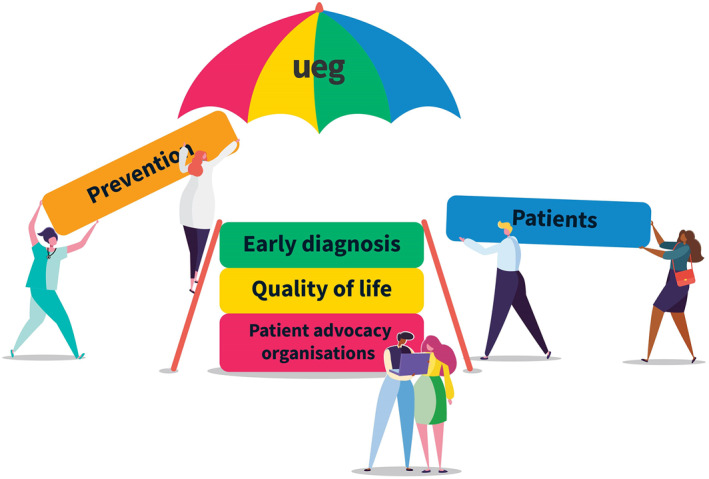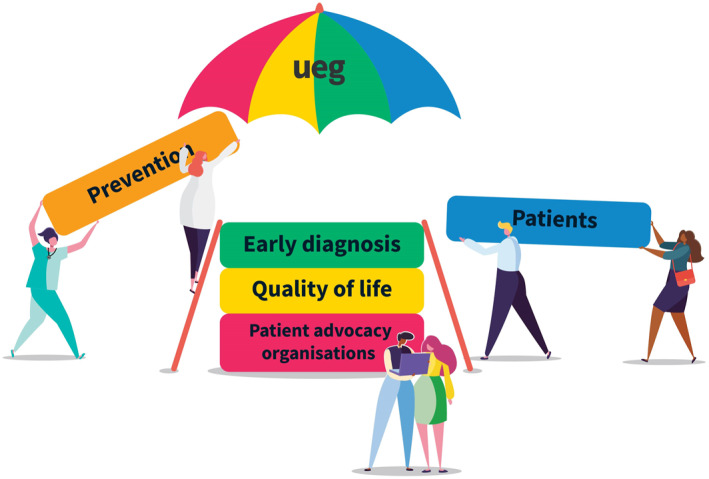Abstract

Keywords: advocacy, early diagnosis, patient‐centered care, patients, prevention, quality of care
Establishing and nurturing strong patient relations stands as an essential pillar in the framework of UEG. Within Europe's diverse healthcare landscape, fostering strong relations and collaboration among the digestive health community will not only optimize healthcare outcomes but also establish solidarity and mutual understanding between healthcare professionals, patients, and patient advocates.
By prioritizing patient‐centered approaches in our advocacy efforts, and recognizing patient advocates as active partners, we ensure that healthcare services are tailored to meet individual needs and preferences.
With these considerations in mind, at UEG Week 2023 in Copenhagen, UEG launched the Digestive Health Roundtable, a new format of dialog between experts in digestive health and dedicated patient advocates. This event marked the first in a series of multidisciplinary meetings, all driven by a shared purpose—to address challenges, identify opportunities and reach consensus on joint actions aimed at improving digestive health across Europe.
We were pleased to be joined by representatives from the Association of European Coeliac Societies, Digestive Cancers Europe, the European Federation of Crohn's & Ulcerative Colitis Associations (EFCCA), the European Liver Patient Association, the Danish Celiac Association, the Danish Colitis‐Crohn Association, and the Danish Liver Association.
The meeting was also joined remotely by Dr Kremlin Wickramasinghe—Regional Adviser for Nutrition, Physical Activity and Obesity at WHO/Europe. He reported that, according to WHO data (WHO Global Health Estimates 2020), the burden of noncommunicable diseases has increased continuously over recent years worldwide, and in 2021 they caused 90% of deaths and 85% of years lived with disability in the WHO European Region. Digestive diseases were reported as the fourth cause of death among all NCD‐related deaths in 2019. Moreover, Dr Wickramasinghe reported alarming data on obesity and overweight, notably in children, where the findings show that 29% of children in Europe, aged 7–9 years old, are overweight or obese (WHO European Childhood Obesity Surveillance Initiative [or COSI], Report on the fifth round of data collection, 2018–2020 [https://apps.who.int/iris/handle/10665/363950]).
The roundtable attendees discussed recommendations across three core topics crucial to shaping a healthier future: prevention, early diagnosis, and quality of life (Figure 1).
FIGURE 1.

Visual representation of the group discussions involving medical experts and patient advocates on three key topics: prevention, early diagnosis, and quality of life.
THE VITAL ROLE OF PREVENTION IN HEALTHCARE
Prevention was identified as a core priority for the digestive health community. Among the challenges identified were low health literacy at societal levels, exacerbated by inadequate awareness and/or tools for early diagnosis for some conditions, and the persistent lack of incentives at the societal level for addressing addictions and/or implementing measures to improve digestive health. Furthermore, the erosion of trust in medical information and healthcare professionals following the COVID pandemic underscored the urgent need for intervention.
It was recognized that current measures targeting risk factors often place undue emphasis on individual responsibility, neglecting systemic changes and lack of basic living conditions (like unemployment, poor housing, unsafe neighborhoods, pollution etc.). In response to these challenges, the group rallied around a series of proactive measures aimed at effecting positive change. These included a commitment to investing more in education across all social groups to enhance health literacy and community awareness, particularly regarding early signs of diseases, healthy habits, and the critical role of healthy nutrition.
Additionally, there was consensus on the necessity of enhancing healthcare professionals' training, particularly in areas such as nutrition. The group also advocated for addressing physical inactivity in the workplace through the implementation of designated exercise time and the provision of on‐site facilities to support employees. Furthermore, there was a resounding call for increased governmental and international investment in combating misinformation and disseminating credible, well‐targeted information to rebuild trust in scientific evidence. This will improve the uptake of national vaccination and screening programs, and thereby improve health outcomes.
Underlining the need for collaboration across various sectors, the group identified key stakeholders for engagement. These include actors of change such as parents and educators, who play pivotal roles in shaping health behaviors and attitudes from an early age. Additionally, actors of power such as local policymakers, the WHO, and EU institutions were highlighted as crucial collaborators in driving policy changes and implementing systemic interventions.
Furthermore, the group underscored the importance of engaging with the food and agriculture industry, particularly in advising on topics of mutual interest, such as dietary requirements for coeliac patients. However, it was also noted that aligning with industries contributing to health harms, such as alcohol and tobacco, would be contrary to the group's mission, emphasizing the need for ethical partnerships in pursuit of improved digestive health outcomes.
THE IMPACT OF DELAYED DIAGNOSIS
The group who discussed challenges related to diagnosis identified persistent barriers to accessing primary care, characterized by a lack of specific knowledge among healthcare providers and the burden of repeated examinations. Additionally, the group emphasized the widespread difficulty in accessing timely diagnoses across many countries, highlighting the detrimental impact of misdiagnosis on patients' quality of life and mental well‐being. Furthermore, concerns were raised regarding the risk of overdiagnosis, particularly in cases where treatments may impact on patients' quality of life, as observed in certain cancer diagnoses.
Knowledge of age‐related signs and symptoms affects the efficiency of timely diagnosis, especially in the younger patients.
In response to these challenges, the group presented a series of best practice examples aimed at improving healthcare delivery and patient outcomes. These included prioritizing prevention as the most cost‐effective investment, increasing awareness of early disease signs within healthcare settings, and championing patient‐centered care by involving patients as partners in their illness experiences.
The group also underscored the importance of anti‐stigma training for healthcare providers and the prioritization of transitional care services. Looking ahead, the group emphasized the critical importance of collaboration between healthcare professionals and patient representatives in developing evidence‐based guidelines, which should be translated at national levels and made accessible to non‐specialists.
Furthermore, joint advocacy projects were deemed essential involving key stakeholders such as patient representatives, healthcare professionals, and policymakers. Collaboration with educational institutions and representatives from the school system was also highlighted as a vital avenue for promoting health literacy and early intervention initiatives within communities.
THE JOURNEY TO QUALITY LIVING
When discussing quality of care, the biggest reported challenge faced by the patient community was the prevalent stigma experienced by patients, which takes a heavy toll on their well‐being, particularly among those diagnosed with liver diseases and inflammatory bowel diseases.
The group also highlighted the detrimental effects of a lack of knowledge, which often manifests in patients experiencing feelings of guilt and shame. Additionally, the strain placed on healthcare systems was identified as a significant factor impacting both the quality of life of healthcare professionals and their ability to deliver personalized and compassionate care, and the well‐being of family members caring for patients.
In response to these pressing issues, the group formulated a set of recommendations aimed at tackling these challenges head‐on. These recommendations included prioritizing self‐management education for patients, fostering effective communication between healthcare professionals and patients, and ensuring the active involvement of patients in setting standards of care. Furthermore, the group advocated for the implementation of holistic care approaches and the reduction of logistical and bureaucratic barriers within healthcare systems. Moreover, the identification and implementation of transitions of care interventions were deemed crucial steps toward improving the quality of life among patients and alleviating the burden on healthcare systems and caregivers alike. Through concerted action on these recommendations, the group endeavors to address the multifaceted challenges faced by individuals within the digestive health community, fostering improved outcomes and well‐being for all stakeholders involved.
In conclusion, the collaborative efforts initiated by the first Digestive Health Roundtable mark a significant step forward in enhancing patient relations within the digestive healthcare landscape. As we navigate the complexities of modern healthcare, it is imperative that we continue to prioritize the voices and experiences of patients, recognizing them as invaluable partners in the pursuit of improved health outcomes and quality of care.
Moving forward, we remain committed to nurturing these relationships, advocating for the integration of joint recommendations into policy‐making and clinical practice, and ensuring that every individual receives optimal care.
CONFLICT OF INTEREST STATEMENT
The authors have no conflicts of interest to declare.
WHO Disclaimer: WHO authors alone are responsible for the views expressed in this article and they do not necessarily represent the views, decisions, or policies of the WHO or institutions with which they are affiliated.
Collaborators: UEG Public Affairs Group.
DATA AVAILABILITY STATEMENT
The data that support the findings of this study are available from the corresponding author upon reasonable request.
Associated Data
This section collects any data citations, data availability statements, or supplementary materials included in this article.
Data Availability Statement
The data that support the findings of this study are available from the corresponding author upon reasonable request.


